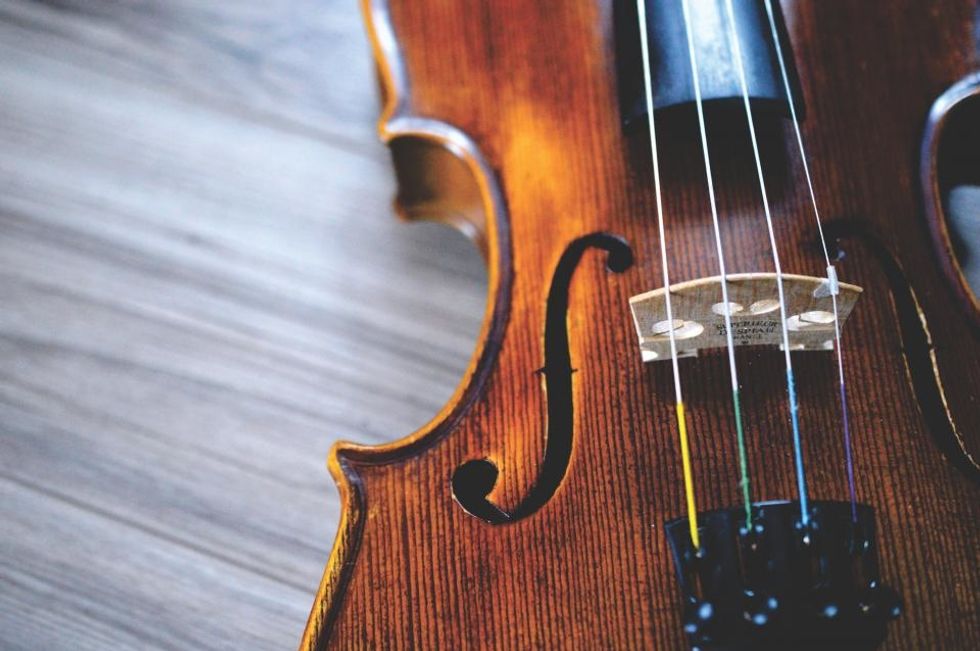Happiness. Fear. Alarm. Love. Ohio University's very own Wind Symphony and Symphonic Band set out to spark many emotions in the audience. And they were, of course, successful. No one would expect any less from a band who has recorded music in Carnegie Hall. The use of sound texture in all six of the inspired pieces of music that both OU bands performed assisted in telling unique stories and conveying meaning to us, the audience. With any great story, emotions are bound to grab hold of whoever is listening. I caught myself laughing out loud during one song and on the verge of tears the very next. Before September 27th this year, I had no idea that classical music could affect me in such a way.
Part of what makes us human is our emotions, and music is one way we are able to convey them. It doesn't even matter what language you speak for you to feel the music's tone as long as the composer did their job correctly. I beautiful example of human emotions communicated through music would be Symphony No. 2 "VOICES" by James Stephenson. He specifically composed this song with the language barrier in mind. Stephenson explains his inspiration, stating, "I was awaiting an international flight when I heard the distinct sound of laughter coming from behind me. Because I could not see the people laughing, it occurred to me that it was a universal language of happiness; one which cannot evoke any judgment based on racial, religious, gender, social, or any other type of prejudice." It definitely was a happy sounding song, for the most part, and even included a voice within the composition. Sometimes, however, the instruments sounded like screams. It was sweet and sickly at the same time, much like humanity in general. Stephenson seemed to capture human emotion in this song, and the Ohio University Wind Symphony did a wonderful job in conveying these emotions to the audience.
Another composition was by a woman by the name of Julie Giroux. She wrote her song "Riften Wed" based on the popular video game Skyrim. According to Giroux herself, "'Riften Wed' is the music for loves and unions, past and present such as this. A love, a wedding, a lifetime shared by two people in the middle of a storm that threatens to tear them apart. Where 'til death do us part' is not only a reality, it's a given. Where love is a gift worthy of all the joy and pain it demands." This particular composer happens to be gay, which adds to the much-needed diversity of modern classical music.
Before I heard this song live, I predicted that it would create warm, fuzzy emotions for the listeners based on the fact that it was essentially about love. I was gravely mistaken. As I finally got to listen to it live, I felt somber and almost scared for who/what I love most. I thought of my aging thirteen-year-old dog, who has lived as my companion for most of my life. At that moment I realized that I would actually die for those I truly love, and I think that this was the whole point of the composition. Skyrim, the video game that "Riften Wed" was based on, is a very brutal and violent game with mortality rules similar to the real world. Marrying someone in the game takes "until death do you part" very literally. If your partner dies, they won't respawn. They are gone forever, and you are alone. It chilled me to my core listening to this piece. The piano notes especially got to me, as they almost sounded like the tears of the bride/groom whose spouse was killed. It was a beautiful piece filled with raw emotion, adding to the purpose of the band performing as a whole.
Ohio University's very own Wind Symphony and Symphonic Band invoked many emotions in the audience through a rich variety of compositions and instruments. Their choice in compositions took the audience through an emotional journey filled with happiness, despair, and even love. The fact that music can do such a thing to a person is a miracle in and of itself, but the writers of these songs knew exactly how to tug at the heartstrings and even open some tear ducts. With this experience, I now understand was it truly means to be moved by classical music.





















